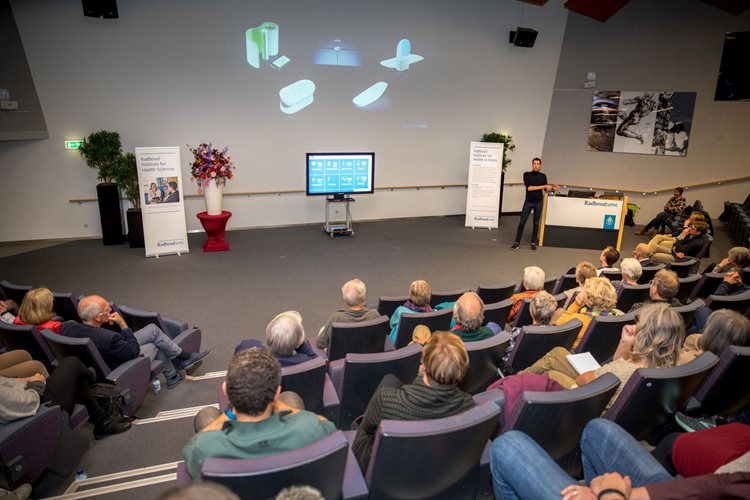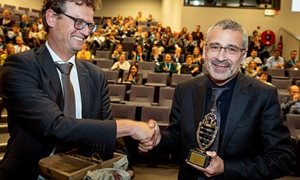31 October 2018
Biomedical researcher Tom van de Belt kicked off the evening, while the audience could watch his vital values on a screen, such as stress level, heart rate, breathing and temperature. All measured by a smart patch on his body. One of the many examples of smart devices with which people can already keep an eye on their own health, and can share that data with their doctor and for scientific research. Because one thing is certain according to Van de Belt: "It's not about technology anymore, but about what we do with it. Care is increasingly becoming 'from hospital, to home, to phone'. Technological applications, for example, ensure that we can monitor people remotely, which means that they have to go to the hospital much less often. I am proud that we are already working in the Radboudumc with very advanced care. "
General practitioner (GP) and researcher Henk Shers outlined digitization among general practitioners. "A wonderful example is www.thuisarts.nl. This website, established by GPs in 2012, has ensured that the number of GP visits in the Netherlands has fallen sharply. One of the most successful innovations in general practice. We already do a lot digital, and that is going to increase. Think of a virtual assistant who gets you on the phone when you call, and does the intake. I can imagine that something like that is no longer far away, for example for GPs.”
Finally, gynecologist Joris van Drongelen was given the stage. He specializes in the treatment and counseling of pregnant women, particularly in complicated pregnancies, and explained how we use technology within Radboudumc to make obstetrics smarter. "By doing some tasks smarter, we create more time for the human contact, for the warm hand." Van Drongelen gives, among other things, the example of blood pressure measurements in women with complicated pregnancies. "We did a study with blood pressure monitors for at home. The blood pressure at home turned out to be significantly lower than in the hospital, and also reliable. Moreover, it saves a pregnant woman a ride to the hospital and saves time on both sides. We will soon have a meeting with an insurer to discuss whether we can roll out this home counseling more broadly."
After one and a half hour Bart Kiemeney closes the evening: "In the new plans of Radboudumc you can see that the hospital is going to be smaller than is currently the case. After tonight, you will undoubtedly understand why. "
More information

 If you are pregnant you can measure your blood pressure, make a heart movie or maybe even an ultrasound with smart technology at home, and share it with your (house) doctor via 'the cloud' instead of going to the hospital. A patch that measures your heart rate, stress level and many more things, and gives a signal to your doctor if something seems to go wrong. A chatbot that provides you with health advice or a virtual doctor's assistant. Or your smartphone as health monitor that collects data and shares it with researchers.
If you are pregnant you can measure your blood pressure, make a heart movie or maybe even an ultrasound with smart technology at home, and share it with your (house) doctor via 'the cloud' instead of going to the hospital. A patch that measures your heart rate, stress level and many more things, and gives a signal to your doctor if something seems to go wrong. A chatbot that provides you with health advice or a virtual doctor's assistant. Or your smartphone as health monitor that collects data and shares it with researchers.
Biomedical researcher Tom van de Belt kicked off the evening, while the audience could watch his vital values on a screen, such as stress level, heart rate, breathing and temperature. All measured by a smart patch on his body. One of the many examples of smart devices with which people can already keep an eye on their own health, and can share that data with their doctor and for scientific research. Because one thing is certain according to Van de Belt: "It's not about technology anymore, but about what we do with it. Care is increasingly becoming 'from hospital, to home, to phone'. Technological applications, for example, ensure that we can monitor people remotely, which means that they have to go to the hospital much less often. I am proud that we are already working in the Radboudumc with very advanced care. "
General practitioner (GP) and researcher Henk Shers outlined digitization among general practitioners. "A wonderful example is www.thuisarts.nl. This website, established by GPs in 2012, has ensured that the number of GP visits in the Netherlands has fallen sharply. One of the most successful innovations in general practice. We already do a lot digital, and that is going to increase. Think of a virtual assistant who gets you on the phone when you call, and does the intake. I can imagine that something like that is no longer far away, for example for GPs.”
Finally, gynecologist Joris van Drongelen was given the stage. He specializes in the treatment and counseling of pregnant women, particularly in complicated pregnancies, and explained how we use technology within Radboudumc to make obstetrics smarter. "By doing some tasks smarter, we create more time for the human contact, for the warm hand." Van Drongelen gives, among other things, the example of blood pressure measurements in women with complicated pregnancies. "We did a study with blood pressure monitors for at home. The blood pressure at home turned out to be significantly lower than in the hospital, and also reliable. Moreover, it saves a pregnant woman a ride to the hospital and saves time on both sides. We will soon have a meeting with an insurer to discuss whether we can roll out this home counseling more broadly."
After one and a half hour Bart Kiemeney closes the evening: "In the new plans of Radboudumc you can see that the hospital is going to be smaller than is currently the case. After tonight, you will undoubtedly understand why. "
New Frontiers
This public evening is part of the Radboud New Frontiers symposium, which will be organized on 1 and 2 November by the Radboud Institute for Health Sciences. The first day, intended for scientists, is dedicated to Big data and its influence on health care (in English). Network care is central to the second day (in Dutch). How do you get adequate network care for each other? On what scale should it be and who takes the lead?More information
Related news items

RIMLS awards call for nominations
19 October 2021 RIMLS awards several prizes to stimulate and honor our (young) researchers. Upcoming awards are Supervisor of the Year, Best Master Thesis, Best Publication, Best Image and more. Send your nominations now before 24 November 2021. go to page
Report of the 12th New Frontiers symposium Big data, better healthcare? - 1 November 2018
7 November 2018 Examples from the application of deep learning to image reading in pathology and radiology and the application of network medicine to monitor infectious disease outbreaks or collective mood states using twitter data showed the huge potential of big data approaches for building better healthcare. go to page
Report of the 12th New Frontiers symposium Better care, network care? - 2 November 2018
7 November 2018 No easy answers at this symposium last Friday, only challenges that can be overcome if we succeed in 5 things. First and most radically, put patients in the center of healthcare. Second, start with assessing what the local population needs and not what local professionals have to offer. go to page
Save the date for Radboud New Frontiers 2018: Betere zorg, netwerkzorg?
17 January 2018 After standard care, standardized care, and personalized care, network care will be care 4.0. But how exactly do you do that? Should we create new structures for it or is it just a matter of trust and ability to step back? go to page
Save the date for Radboud New Frontiers 2018: Big data, better healthcare?
17 January 2018 How is big data influencing healthcare and healthcare research? How will it help us and what are the limitations? The first day of the 12th edition of the Radboud New Frontiers symposium, on 1 November 2018, will give you all the answers (and raises new questions). go to page